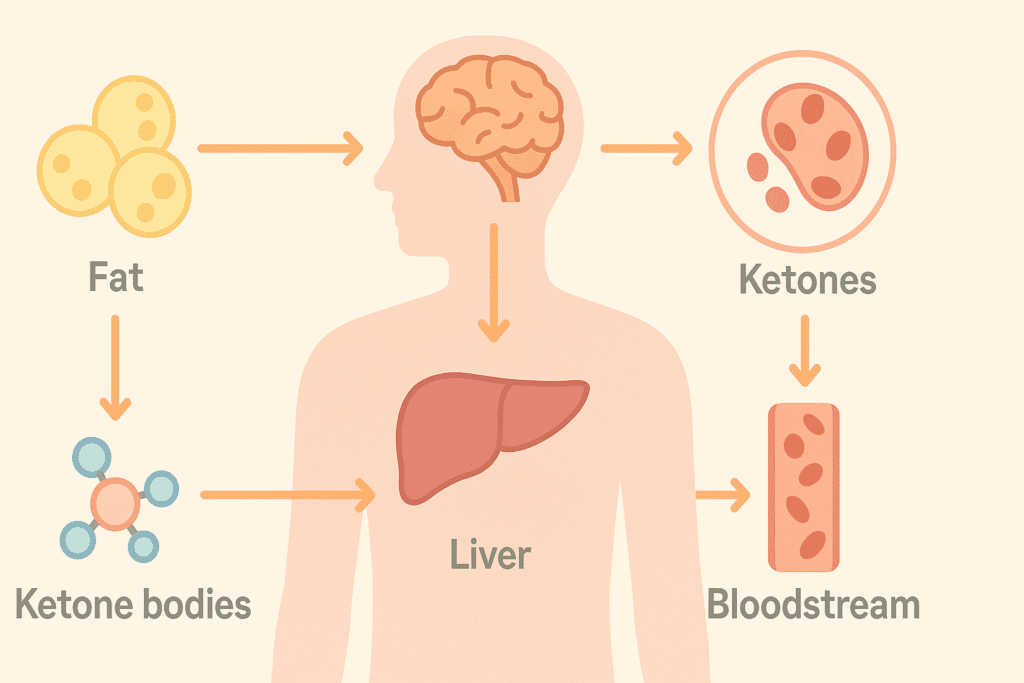In today’s health-conscious landscape, few diets have gained as much traction or controversy as the ketogenic diet. Often referred to simply as the “keto diet,” this low-carbohydrate, high-fat eating plan has inspired passionate advocates and skeptical critics alike. Promoted for its ability to trigger rapid weight loss and enhance metabolic function, the keto lifestyle has become a modern dietary phenomenon. But while many hail its effectiveness, others warn of the potential health risks and long-term consequences. Is the keto diet safe, or could it be dangerous in certain contexts? To answer this question responsibly, we must explore the full spectrum of what the ketogenic diet entails—its scientific foundation, health benefits, potential drawbacks, and the nuanced expert perspectives that continue to evolve alongside emerging research.
You may also like: 1400 Calorie Diet Meal Plan: A Balanced Guide for Weight Loss and Wellness

Understanding the Basics of the Keto Diet
To evaluate the safety of the keto diet, it’s essential first to understand what keto means in nutritional and physiological terms. At its core, the ketogenic diet is structured to significantly reduce carbohydrate intake, replacing it with fat as the primary source of energy. This drastic macronutrient shift forces the body into a state known as ketosis, where fat is metabolized into molecules called ketones. These ketones then become the body’s main energy source, replacing glucose derived from carbohydrates.
The typical keto diet restricts daily carbohydrate intake to around 20 to 50 grams, though variations exist depending on individual goals and metabolic response. Understanding how many carbs on keto are allowed is critical to maintaining this delicate state of ketosis. Unlike standard diets that rely on carb-rich staples like bread, pasta, or fruit, keto diet foods include avocados, eggs, fatty fish, nuts, seeds, butter, oils, and moderate amounts of leafy vegetables and protein. This shift can be quite profound, as it fundamentally alters how the body processes fuel and regulates insulin levels.
One reason the keto basics have gained popularity is the efficiency with which ketosis can promote fat burning, often resulting in visible weight loss within a relatively short period. For many who adopt this dietary plan, the promise of keto weight loss serves as a compelling motivator. However, sustaining a state of ketosis requires consistent dietary discipline, which can pose challenges for long-term adherence and health.

The Science Behind Ketosis: What Is Ketosis and How Does It Work?
To fully appreciate the ketogenic diet, one must delve into the science of what is ketosis and how this metabolic adaptation occurs. When carbohydrate intake falls below a certain threshold, insulin levels drop and the body begins to break down fat stores into free fatty acids. These are then converted by the liver into ketone bodies—primarily beta-hydroxybutyrate (BHB), acetoacetate, and acetone.
These ketones are capable of crossing the blood-brain barrier, offering an efficient alternative fuel source for the brain, which typically relies on glucose. This is particularly important during prolonged fasting or carbohydrate restriction, as it allows the body to continue functioning effectively despite low glucose availability. From a biochemical standpoint, ketosis is a highly adaptive response to energy scarcity—an evolutionary mechanism that enabled early humans to survive during times of food scarcity.
However, a common question that arises is: is ketosis dangerous? For most healthy individuals, short-term ketosis is not inherently harmful. In fact, it can be a therapeutic tool in certain medical contexts, such as treatment-resistant epilepsy. But sustaining ketosis over the long term may carry health implications that require careful consideration, particularly for individuals with preexisting conditions.

Evaluating the Benefits: Does Keto Work for Weight Loss and Health?
Proponents of the ketogenic diet often highlight its powerful potential for fat reduction, enhanced mental clarity, and blood sugar control. Numerous studies suggest that ketogenic diet weight loss can occur more rapidly in the initial stages compared to other diets, largely due to a combination of reduced appetite, increased satiety, and accelerated fat oxidation.
Moreover, for individuals with insulin resistance or type 2 diabetes, the ketogenic diet may offer substantial improvements in glycemic control. By minimizing carbohydrate intake, insulin levels are stabilized, which can reduce the need for exogenous insulin or hypoglycemic medications in certain patients. Additionally, some research indicates that ketogenic diets may reduce systemic inflammation and support improved lipid profiles—though findings are mixed and often context-dependent.
It’s also worth noting that many individuals experience a psychological benefit when following the keto diet. A clear set of rules regarding allowed keto diet foods can provide structure, reducing decision fatigue and making dietary adherence more manageable. In this way, the diet’s simplicity—once learned—can become a strength.
Still, the question remains: does keto work for everyone? The answer is more complex than a simple yes or no. While many individuals report significant improvements in body composition and metabolic markers, others struggle with side effects, dietary monotony, or unsustainable restrictions. A personalized approach, ideally guided by a nutrition professional, is essential for determining whether keto is the right fit.

Is the Keto Diet Safe? Unpacking the Medical and Nutritional Perspectives
When examining the question is keto diet safe, it is critical to look beyond anecdotal success stories and explore the evidence-based perspectives offered by medical and nutrition professionals. Short-term adherence to a well-formulated ketogenic diet is generally considered safe for most healthy individuals. However, the long-term safety of this diet is less well understood, and data on multi-year outcomes remains limited.
Some healthcare providers express concern about potential nutrient deficiencies that can arise due to the exclusion of fruits, legumes, and whole grains. These foods provide essential vitamins, minerals, and fiber—components that are often lacking in poorly planned ketogenic diets. Without proper supplementation or dietary variety, individuals may become deficient in nutrients such as magnesium, potassium, vitamin C, and certain B vitamins.
Moreover, questions surrounding is keto bad for you or is keto dangerous often focus on cardiovascular health. High intake of saturated fats, a hallmark of many keto regimens, may elevate LDL cholesterol in some individuals. While some ketogenic dieters experience improvements in HDL cholesterol and triglyceride levels, others may see adverse lipid changes, especially if their fat sources are predominantly animal-based rather than plant-based.
Another important consideration is digestive health. A lower intake of dietary fiber may affect gut microbiota diversity, leading to constipation or other gastrointestinal discomfort. In addition, there is the potential for an increase in uric acid levels, raising concerns about kidney stone risk in predisposed individuals.

Recognizing the Cons of a Ketogenic Diet
While the benefits of the ketogenic diet can be significant for some, it’s essential to acknowledge the negatives of the keto diet and the specific drawbacks of ketogenic diet practices that might not suit every lifestyle or physiology. One of the most immediate challenges is the so-called “keto flu,” a constellation of symptoms—including fatigue, irritability, nausea, and headaches—that can occur during the transition into ketosis. These side effects are generally temporary but can be discouraging for newcomers.
Beyond the initial adjustment phase, there are long-term cons of keto that deserve scrutiny. For example, social and cultural limitations may emerge, as following a strict low-carb regimen can make dining out, traveling, or participating in communal meals more difficult. Food variety may also be reduced, leading to a repetitive or less satisfying culinary experience over time.
The psychological impact should not be overlooked either. In some individuals, the rigidity of keto can trigger disordered eating behaviors, including binge-restrict cycles or orthorexia—an unhealthy obsession with “clean” eating. Moreover, those asking is the ketogenic diet safe must consider individual health status; for people with gallbladder disease, pancreatic disorders, or rare metabolic conditions, keto may not be advisable at all.
In clinical practice, dietitians often caution against long-term adherence without medical supervision, especially when considering risks of the ketogenic diet such as potential liver stress or electrolyte imbalance. These concerns highlight the importance of a carefully designed plan, ideally tailored to an individual’s unique physiology and health goals.
Is a Keto Diet Healthy for Everyone?
Determining whether the ketogenic approach qualifies as healthy involves examining not only the macro- and micronutrient profiles of the diet, but also its suitability for different populations. For instance, older adults may experience muscle loss if protein intake is insufficient, while athletes may find that high-intensity performance suffers due to reduced glycogen availability.
Nevertheless, some experts argue that the ketogenic diet can be made healthier with strategic planning. Using whole, nutrient-dense keto diet foods—such as olive oil, salmon, leafy greens, and avocados—can promote a more balanced intake and reduce inflammatory risks. Furthermore, supplementing with electrolytes, omega-3 fatty acids, and a broad-spectrum multivitamin may mitigate some of the cons of a ketogenic diet.
Still, the broader question—is a keto diet healthy for the general population—depends on individual metabolic health, dietary preferences, and lifestyle constraints. It is not a one-size-fits-all solution. While keto can support fat loss and blood sugar control, it may not be sustainable or optimal for every person. Personalized medicine and nutritional customization are increasingly recognized as the gold standard, rather than universal dietary prescriptions.
Weighing the Negatives of a Ketogenic Diet: Context Is Key
Not every criticism of keto is unfounded, but not all are universally applicable either. Some of the most commonly cited cons of a ketogenic diet—such as increased cholesterol, lack of fiber, and social rigidity—are indeed valid, but they depend heavily on how the diet is structured. For example, a ketogenic plan composed primarily of bacon and butter differs substantially in nutritional value from one that emphasizes fatty fish, nuts, and cruciferous vegetables.
Understanding the negatives of a ketogenic diet requires careful interpretation of the available data and recognition that individual response varies widely. This is why experts often urge caution in adopting keto based on internet trends or anecdotal stories alone. Working with a licensed healthcare provider or dietitian can help ensure that the diet is balanced, sustainable, and aligned with long-term wellness.
Exploring the Drawbacks of Keto in Clinical and Real-World Settings
Beyond theoretical risks, clinical studies have documented several real-world drawbacks of ketogenic diet adherence. In some patients, adherence drops off after several months, leading to weight regain or frustration. Others may experience complications like nutrient deficiencies, especially if whole food diversity is not maintained.
Moreover, individuals who ask “is ketosis bad” may be concerned with rare but serious conditions like ketoacidosis. It’s important to distinguish nutritional ketosis—a controlled and safe process—from diabetic ketoacidosis, a life-threatening complication typically seen in type 1 diabetes. For healthy individuals, ketosis is not inherently bad, but it must be approached with informed awareness and monitoring.
There’s also a tendency in public discourse to oversimplify keto as either “good” or “bad.” This dichotomy overlooks the nuance required in evaluating whether a dietary plan suits an individual’s biochemical and psychological needs. Instead of asking, “Is keto bad for you?” a better question may be, “How can keto be implemented in a way that supports my specific health goals while minimizing risks?”
Frequently Asked Questions (FAQ): Exploring the Ketogenic Diet
1. How can you transition off the keto diet safely without regaining weight?
Transitioning off the keto diet requires a thoughtful approach to reintroduce carbohydrates while preserving metabolic health. One effective strategy is to gradually increase complex carbs, such as quinoa, sweet potatoes, and legumes, rather than jumping back to refined grains or sugars. This allows the body time to adapt metabolically and reduces the risk of weight rebound. Maintaining a higher intake of protein and fiber-rich keto diet foods during this transition can help you stay satiated and avoid blood sugar spikes. Importantly, if you’ve experienced keto weight loss, the key to keeping it off post-keto is maintaining overall caloric awareness and continuing regular physical activity. The keto basics of reducing processed food still apply even after you shift out of ketosis.
2. Can the ketogenic diet support hormonal balance, especially for women?
Emerging research suggests that the ketogenic diet may influence hormonal pathways, particularly those related to insulin and reproductive hormones. For women with conditions like PCOS (polycystic ovary syndrome), the keto diet has shown potential in regulating cycles and reducing insulin resistance. However, others may find that very low-carb intake can disrupt menstrual regularity, especially if calories are also restricted. The risks of the ketogenic diet in this context include potential thyroid suppression or elevated cortisol if the diet is too extreme or poorly managed. A modified ketogenic plan, with slightly more carbs from whole foods, may be more appropriate for long-term hormonal health. For women, understanding how many carbs on keto is sustainable for their body can make all the difference.
3. What are the long-term psychological effects of following a strict ketogenic diet?
While short-term motivation is often high on keto due to rapid changes in weight and energy, the long-term psychological effects can be more complex. Some individuals develop rigid food rules that border on orthorexia or experience anxiety when deviating from the strict guidelines of keto basics. Social isolation can occur, as dining out or participating in events becomes more difficult. However, others report improved mood and reduced brain fog while in ketosis, especially when they are consuming nutrient-dense ketogenic diet foods. Balancing psychological well-being with the physical benefits is essential, and some find greater sustainability with cyclical or targeted keto approaches, which allow for flexibility while still promoting keto weight loss benefits.
4. Is it safe for athletes or active individuals to follow a ketogenic diet?
Athletes often question whether a ketogenic diet can support their performance, especially in high-intensity sports. While endurance athletes may benefit from the fat-adaptation that ketosis brings, those relying on quick bursts of energy may find that performance drops without sufficient glycogen. A modified ketogenic approach, such as the targeted ketogenic diet (TKD), which includes carbs around workouts, can help bridge this gap. Defining keto as a flexible metabolic tool rather than a rigid diet plan can empower athletes to use it strategically. However, one of the cons of a keto diet for this population is the increased planning needed to ensure muscle recovery and electrolyte balance are maintained.
5. How does the ketogenic diet affect gut health and microbiome diversity?
The gut microbiome thrives on a diverse range of fibers, many of which are limited in the standard ketogenic diet. Some research indicates that certain strains of beneficial bacteria may decline when fiber-rich fruits and legumes are removed. However, others suggest that prebiotic-rich keto diet foods like asparagus, leeks, and chia seeds can support gut health even in low-carb contexts. One potential drawback of the ketogenic diet is reduced microbiota diversity over time, which could impair immune function or digestion. Including fermented foods and diverse low-carb vegetables can help mitigate this issue and ensure that the diet supports both metabolic and gut health.
6. Are there differences in how men and women respond to the ketogenic diet metabolically?
Yes, gender can significantly influence how the body responds to the ketogenic diet. Men often experience faster shifts into ketosis and more pronounced keto weight loss in the initial phases, potentially due to hormonal and muscle mass differences. Women, on the other hand, may be more sensitive to the calorie and carbohydrate restrictions involved, especially if they are under stress or have underlying hormonal imbalances. While the ketogenic diet is safe for most people, women may benefit from more cautious carb cycling or a moderate-carb approach to avoid the negatives of a ketogenic diet, such as disrupted ovulation or adrenal fatigue. This further supports the idea that the ketogenic diet is not one-size-fits-all.
7. What role does sleep play in determining the success or failure of a ketogenic diet?
Sleep plays a surprisingly critical role in how well the body adapts to and sustains ketosis. Poor sleep can increase cortisol levels, which in turn interferes with glucose regulation and fat metabolism. Those new to the ketogenic diet may experience temporary sleep disturbances as their bodies adapt to the shift in energy sources. However, once fully keto-adapted, many report more stable energy levels and deeper sleep. If sleep quality declines on keto, it could be a sign of electrolyte imbalance, overtraining, or under-eating—all of which are cons of keto that can be corrected with professional guidance. Sleep optimization is just as important as tracking how many carbs on keto you’re eating.
8. How does the ketogenic diet influence aging and longevity?
Some animal studies suggest that ketogenic states may enhance longevity by reducing oxidative stress, lowering insulin-like growth factor (IGF-1), and promoting autophagy. These anti-aging mechanisms are exciting but remain largely unproven in long-term human trials. Nonetheless, the keto diet’s ability to improve metabolic flexibility and reduce chronic inflammation may contribute to healthier aging. On the flip side, the cons of a ketogenic diet for aging individuals could include reduced muscle mass if protein intake is not sufficient, which is a key concern for longevity. Seniors considering keto should focus on high-quality ketogenic diet foods and adequate protein to ensure they’re supporting both metabolic and functional health.
9. Can the ketogenic diet be followed sustainably for a lifetime?
Sustainability on keto depends on personal goals, lifestyle, and how the diet is implemented. A strict ketogenic diet may feel restrictive for some over the long haul, especially without variety or flexibility. However, a more balanced approach—sometimes referred to as “lazy keto” or “clean keto”—can be easier to maintain and still provide many of the health benefits. The risks of the ketogenic diet increase when it’s poorly formulated or lacks nutrient diversity, which is why some individuals eventually transition to a lower-carb, Mediterranean-style diet after achieving their goals. Those who ask, “is a keto diet healthy long-term?” should consider sustainability, not just short-term gains, when evaluating if keto works for them.
10. Are there emerging medical uses of the ketogenic diet beyond weight loss and diabetes?
Yes, recent studies have explored the use of the ketogenic diet in neurodegenerative diseases such as Alzheimer’s and Parkinson’s, with early results suggesting that ketosis may offer neuroprotective effects. Researchers are also investigating the diet’s role in cancer metabolism, as cancer cells often rely heavily on glucose for growth. While these areas are still under investigation, they suggest that the basics of keto extend far beyond weight management. However, it’s crucial to note that these applications are medical in nature and should never be pursued without the supervision of a healthcare provider. The future of keto may well lie in targeted medical nutrition, offering new hope for conditions where traditional therapies fall short—despite the known drawbacks of ketogenic diet protocols when self-administered without guidance.
Conclusion: The Keto Diet’s Complex Truth—Safety, Risks, and Who Should Consider It
In the final analysis, the question is keto safe does not lend itself to a simple answer. For many individuals, the ketogenic diet can be a powerful tool for weight loss, improved blood sugar control, and cognitive clarity. But like any dietary intervention, it carries potential risks that must be understood and managed carefully. Whether someone experiences the benefits or the drawbacks of ketogenic diet practices depends on numerous factors, including health status, nutritional knowledge, and long-term commitment.
Is the ketogenic diet safe? In medically supervised, well-balanced implementations, yes—especially in the short term. Is ketosis dangerous? Not inherently, but prolonged or extreme ketosis can lead to unintended side effects if not monitored properly. Ultimately, those considering keto should weigh the cons of a ketogenic diet just as carefully as the potential gains. It’s about finding balance and tailoring nutrition to individual needs, preferences, and medical histories.
For those wondering what does keto mean beyond weight loss, the answer lies in a broader lifestyle transformation rooted in metabolic reconditioning. But the best outcomes come not from adopting trends blindly, but from engaging with science, expert guidance, and a deep understanding of how dietary choices affect the body over time. Keto may not be for everyone—but for some, with the right support, it can be a transformative journey toward better health.
Further Reading:
The Ketogenic Diet: A Detailed Beginner’s Guide to Keto


